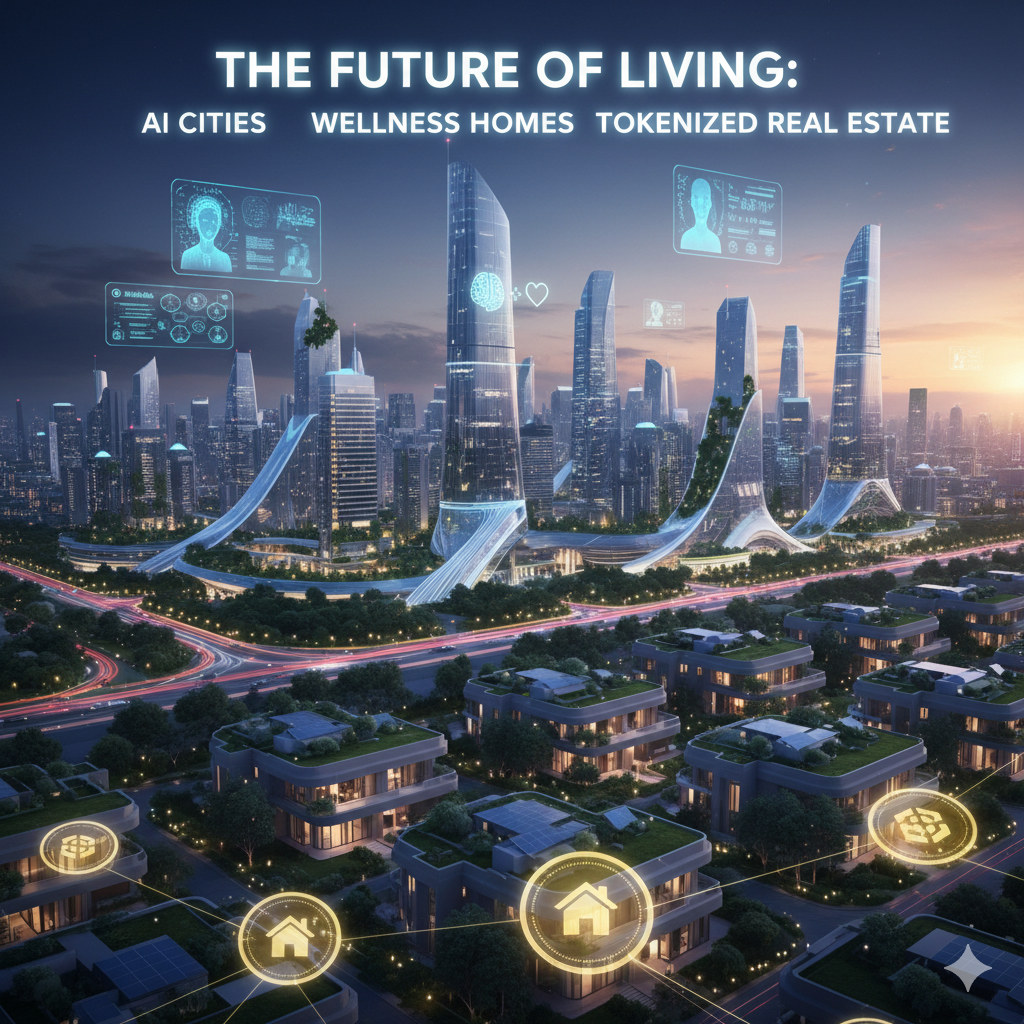
The Future Is Here: 4 Surprising Ways Technology Is Changing Your Home and City
Share
The pace of technological change is relentless. Phones became supercomputers; cars began to drive themselves. Now the same forces are reshaping two fundamentals: where we live and how we belong. Artificial intelligence, blockchain, and advanced sensors are reimagining the home and the city from the ground up.
Are we ready for how radical this gets? Below are four transformations already underway that will redefine the future of living.
1) AI Is Designing—and Running—Cities from Scratch
The first wave of “smart cities” retrofitted sensors onto old infrastructure. The new wave builds AI-native cities outright. Giga-projects (e.g., NEOM) use Digital Twins to simulate housing demand, energy flows, mobility, and construction before the first foundation is poured.
Once built, AI becomes the city’s central nervous system over 5G/6G: vehicles, lights, and transit coordinate to reduce congestion; dynamic grids balance renewables in real time; latency-critical services like remote surgery and city-wide AR/VR become possible. This is not “smart” as a feature—this is intelligent urbanism: a cohesive, adaptive, data-driven organism.
2) Your Future Home Will Be Your Wellness Coach
The next real-estate premium isn’t granite countertops—it’s health intelligence. “Wellness homes” actively monitor and support your body and mind:
- Advanced air & water purification that constantly removes pollutants.
- Circadian lighting that adapts color temperature for sleep–wake rhythms.
- IoT sensors that auto-adjust humidity, ventilation, and air quality.
- Biophilic design—natural light, plants, living walls—to reduce stress.
- Non-toxic, sustainable materials for a cleaner indoor ecosystem.
These are not feel-good upgrades; they’re high-ROI features that protect health and enhance long-term resale in a wellness-aware market.
3) The App You Use for Vacation Is Reshaping Your Rent
AI behind platforms like Airbnb is quietly transforming housing markets. Hyper-personalized matching and dynamic pricing maximize host revenue. The incentive pushes units from long-term leases into short-term inventory, shrinking resident supply and pressuring rents upward.
Cities are responding with tighter policy, but the force remains: algorithmic profitability is a structural driver in urban affordability—an AI effect far beyond tourism.
4) “Owning a Home” Becomes “Owning a Portfolio”
Blockchain enables asset tokenization: digitizing real assets into fractional, tradable tokens. Real estate that once required six figures can be owned in slices—allowing diversified property portfolios across cities and countries.
The idea stretches to mobility and beyond. Tokenized car fleets (e.g., Teslas in Vienna) distribute rental revenue to token holders. It fits modern life: flexibility, liquidity, global access—perfect for digital nomads who rent where they live and invest where returns make sense.
Conclusion: Redefining “Home” in an Intelligent World
Tomorrow’s tech is already here. AI designs our cities, homes coach our health, platforms quietly bend rental markets, and blockchain liquefies ownership. As homes become wellness hubs and ownership becomes portfolios, our sense of community and belonging will evolve with them.
The question is no longer if these shifts arrive—but how we align with them: choosing healthier spaces, smarter infrastructure, and more sovereign financial architectures.
Explore more with Ecoscopia:
Bitcoin Astro Live Chart: ecoscopia.net/products/bitcoin-btc-astro-live-chart
Ethereum Astro Live Chart: ecoscopia.net/products/ethereum-eth-astro-live-chart
S&P 500 Live Chart: ecoscopia.net/products/spx-live-chart
Gold XAU Live Chart: ecoscopia.net/products/gold-xau-live-chart


